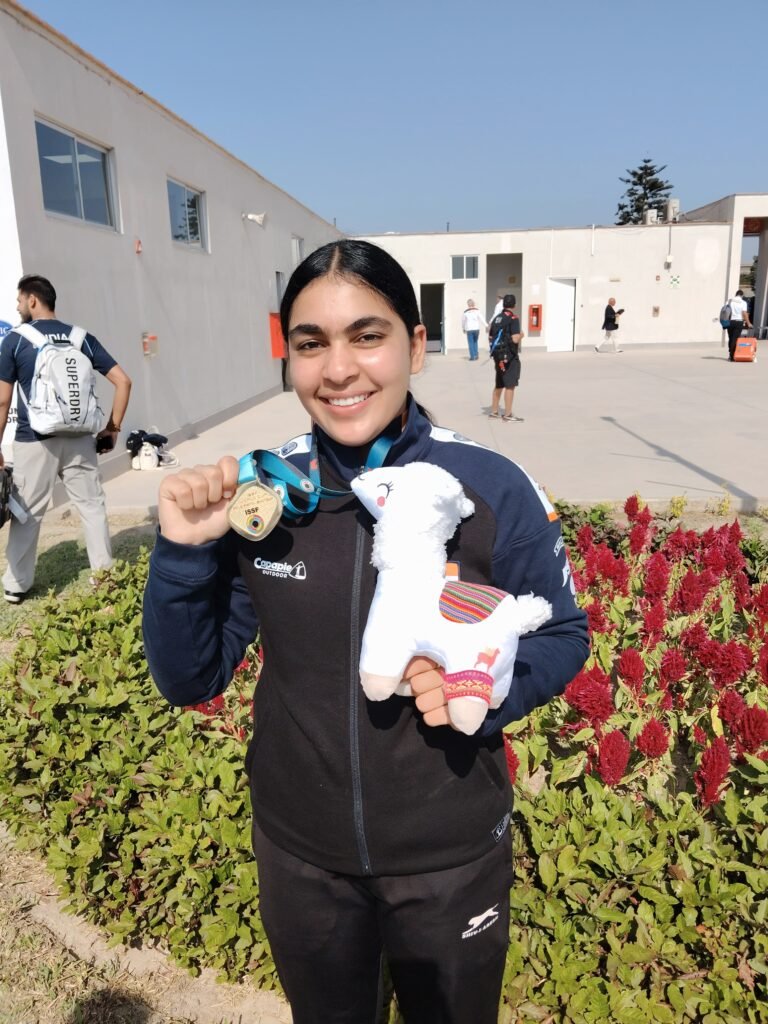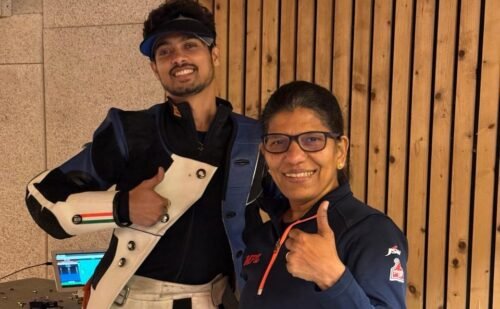At just 19, the pistol shooter has won all the three World Cup stages in the season, with the latest coming at the prestigious Munich meet — a clear glimpse of a talent destined for even greater glory

Suruchi Phogat won gold in ISSF Munich World Cup.
Our Correspondent
Suruchi Phogat is a rare talent, one who deserves to be nurtured with care. At just 19, she has emerged as the new sensation in Indian shooting, with her reputation growing stronger with every tournament.
On Friday, she completed a remarkable hat-trick of World Cup individual titles in her debut year, clinching gold in the 10m air pistol event at the prestigious Munich World Cup. This latest triumph follows her victories at the ISSF World Cup stages in Buenos Aires and Lima, firmly establishing her as the shooter to beat in the women’s 10m air pistol category. Her undefeated streak this season places her alongside an elite group of Chinese shooters — Sun Yujie (25m pistol), Wang Zifei (women’s 10m air rifle), and Hu Kai (men’s 10m air pistol) — all of whom have dominated in their respective categories in World Cup this year.
Suruchi has demonstrated remarkable poise, maturity, and the ability to stay calm under pressure. The presence of World Championship and Olympic medallists in the field has only served as a catalyst for her to showcase her skills — a true hallmark of a champion.
While her gold medals in Buenos Aires and Lima were impressive achievements in their own right, her triumph in Munich stands out. The Munich World Cup is considered the most competitive, with a field packed with accomplished shooters, including Olympic and World Championship medallists all vying for top honors.
Indian shooting has produced a number of promising talents in recent years, but identifying and nurturing those capable of delivering at the highest level remains crucial. Suruchi has proven she’s not just another talent, but an exceptional shooter. Earlier this year, she swept all three individual titles (senior, junior, and youth) at the National Championships. In just six months, the shooter from Haryana has extended her dominance to the world stage.
As she prepares for the upcoming World Championships later this year, all eyes will be on how she handles the added pressure. With the Asian Games scheduled for next year and the Los Angeles Olympics in 2028, her schedule will need to be carefully managed to ensure peak performance in major competitions.
Saurabh Chaudhary — the name certainly rings a bell. An exceptional shooter, he made a brilliant transition from junior to senior level around 2018–2019, consistently making it to the podium with remarkable regularity. He reached the final at the Tokyo Olympics but finished 7th. After that, Saurabh lost his place in the national team and struggled for nearly three years to make a comeback. He eventually missed out on the Paris Olympics, a tough blow for such a talented athlete. It is only this year that he has made his way back into the national setup.
Not to forget Angad Vir Singh Bajwa, who in 2018 etched his name into history by becoming the first shooter to score a perfect 60 out of 60 in a skeet final — a world record. Expectations were high, but he finished 18th at the Tokyo Olympics.
Talents like Saurabh, Angad, and Suruchi deserve to be backed consistently, even when results don’t come for a brief period. They need time, support, and the right environment to learn how to handle the immense pressure of big competitions. Nurturing such potential is essential for long-term success of Indian shooting on the international stage.
In Munich, Suruchi soaked in all the pressure to achieve success. She faced stiff competition from Paris Olympics silver medallist Camille Jedrzejewski and China’s Yao Qianxuan, who had earlier broken the junior world record with a score of 589 in qualification.
It was a thrilling contest, with the lead changing hands several times. Suruchi, however, displayed a fearless attitude as the final reached its climax. After a strong start, she was closely pursued by Turkey’s Sevval Ilayda Tarhan, Camille, and Yao. Remaining solidly among the top three, she narrowly edged out Yao by 0.2 points in the elimination for third place.
Camille had built a commanding lead of 1.5 points after 20 shots, shooting a consistent series of high 10s. But Suruchi stayed positive, capitalizing on Camille ’s slip in the penultimate series, where she shot an 8.9 and a 9.7. Going into the final two shots, the gap had narrowed to just 0.5 points.
Suruchi delivered a brilliant 10.5 on the 23rd shot — a crucial moment in the final — while Camille managed only 9.5. With a slender lead in hand, Suruchi shot a 9.5 on her final attempt, visibly displeased as she put her pistol down. But as the saying goes, fortune favors the brave. Camille could only muster a 9.8, settling for the silver medal. Suruchi’s final score was 241.9, edging past Camille by a narrow margin of 0.2 points.
She had also impressed in qualification, scoring 588 to equal the national record held by Paris Olympics bronze medallist Manu Bhaker. Manu was also in the field but failed to qualify for the final, finishing 25th.



